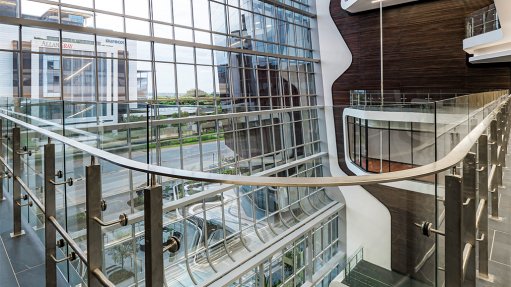
The Morgan Stanley Capital International (MSCI) South Africa Green Annual Property Index for 2022 has shown that green-certified prime and A-grade offices produced an improved total return last year and outperformed noncertified office assets of a similar quality by 50 basis points during the year.
Released yearly since 2016, in conjunction with the Green Building Council South Africa (GBCSA) and sponsored by JSE-listed Growthpoint Properties, the index provides an independent, globally consistent view on the investment performance of green-certified and noncertified offices.
“The MSCI index once again shows that green buildings are good investments [and] reflects lower power and water costs in these properties. At a time when tenants are looking at total cost of occupation, and utility prices keep escalating, it makes sense to rent space in a green efficient building. Added to that, the cost of providing backup power to these properties will be reduced, because consumption is lower,” Growthpoint asset management head for offices Paul Kollenberg said on May 17.
At the end of last year, the index sample comprised 303 prime and A-grade office properties valued at R58.2-billion, of which 164 were green-certified buildings. These were compared to 112 noncertified offices of a similar quality.
“These results confirm that there are long-term benefits associated with pursuing green building certification. With some tough market conditions at play, green-certified buildings are demonstrating their resilience and value,” GBCSA technical head Georgina Smit said.
Last year, the green-certified office sample delivered a total return of 6.1%, 50 basis points above the noncertified sample’s return of 5.6%. Since the index’s inception in 2016, the sample of green-certified offices outperformed the non-certified sample by a cumulative 20.9%.
Over this seven-year period, green-certified offices had a 2.1% lower vacancy rate and 1% higher net operating income (NOI) growth. This NOI growth underpinned green offices’ income return, which was in line with that of non-certified offices despite a 25% higher capital value per square metre. A 30% higher NOI per square meter compared to non-certified office buildings reinforced the premium that blue-chip occupiers are placing on green office accommodation, according to the MSCI index.
Green-certified offices had 4.5% lower electricity use and 14.3% less water use per square metre when compared to non-certified offices. With administered costs rising faster than inflation, these costs can have a significant impact on performance over the lifecycle of a property.
Last year, the green-certified office sample’s gross cost-to-income ratio was 39.7%, substantially lower than the 43% of the non-certified subset. As a result, green offices had a 20 basis point lower capitalisation rate and a higher forward income growth, implying that its future cashflows were deemed both lower risk and likely to grow at a faster rate.
The MSCI South Africa Green Annual Property Index demonstrated the positive relationship between green-certified buildings and investment returns but also of its impact on property fundamentals that could underpin future performance.
“The highlight of these results lies in the reduced cost-to-income ratios. It shows that through certification, owners can manage costs better because they have future-proofed their assets. In the current market where rentals are difficult to increase, managing costs is more important than ever, especially water and electricity, so efficiency is paramount,” MSCI VP Eileen Andrew said.
GBCSA CEO Lisa Reynolds added that the conversation had shifted over the past few years.
“Green-certified buildings always made business sense due to the financial savings in the utility bills. Currently, we add the concepts of risk into the conversations – the risks due to the impact of climate change, the risks due to the lack of resource security and, most importantly, the risk of stranded assets. Certified green buildings play a huge role in mitigating these risks. I believe that this is confirmed by the MSCI results,” she said.
Growthpoint owns and manages the largest portfolio of green-certified buildings in Africa. The company aims to certify its entire portfolio of buildings as carbon neutral by 2050.
“In addition to the financial, operational and risk-mitigating advantages demonstrated by the MSCI index, green buildings are essential for organisations – both landlords and tenants – to meet their environmental, social and governance commitments,” Growthpoint sustainability and utilities head Grahame Cruickshanks said.